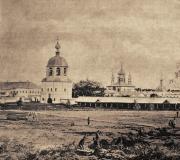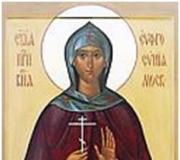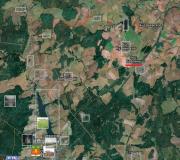Not yours, not mine, but ours, a fairy tale. “And again - the impulses of youth...” Alexander Blok
Malyarevsky Pavel Grigorievich (8 (21). I. 1904, Tobolsk - 4. III. 1961, Moscow) - Russian Soviet writer, playwright, theater historian, laureate Stalin Prize third degree (1952). Lived in Irkutsk.
Born into the family of an inspector of public schools in Tobolsk (at that time a diocesan observer of parochial schools and literacy schools) G.Ya. Malyarevsky. Pavel, like all the children of the Malyarevsky family, loved literature, theater, and was fond of writing poetry and family performances. In 1921, he graduated from school and worked as a librarian for two years, then he went to study in distant Irkutsk, and never returned back to his homeland. He received his education in 1923–1927 at the Faculty of Law and Economics, Irkutsk state university(ISU), lawyer by profession. IN student years Malyarevsky wrote the libretto for amateur operettas, scripts for heroic performances and mass performances, which were staged in the squares of Irkutsk in the late 1920s, and appeared in the newspaper with feuilletons and articles.
In 1927–32, Malyarevsky worked in the Irkutsk District Workers' and Peasants' Inspectorate (RKI). Since the early 1930s, he has been actively publishing poems, plays, poems in the pages of the magazine “Future Siberia”. In 1932–37 he taught at ISU.
The first plays “Dorji Banzarov” (1935) and “Soviet Heights” (1938) became a “prologue” to the cycle of plays of the 1940s with a predominance of folklore and “children’s” themes. In 1936, he wrote the first fairy tale play “Puss in Boots” based on the tale of Charles Perrault, and in 1937, based on Buryat folklore, he wrote the play “Happiness”, staged on the stages of theaters in Irkutsk, Buryatia and Mongolia. It was followed by “The Sword of China” (1942), “The Fall of the Island of Blutenbeil” (1944), “The Wonderful Treasure” (1947), “ Stronger than death"(1947), "Not mine, not yours, but ours" (1950), "The Tale of a Turnip" (1950), "The Little Humpbacked Horse" (1951), "New Year's Dream" (1955), "Stone Bird" (1958) - a series of plays for children based on famous literary works and folklore stories.
Irkutsk philologist N. Antipyev wrote: “Pavel Grigorievich Malyarevsky had a rare gift for a playwright to transform into his heroes. He imagined, to the point of visible tangibility, exactly how his hero thinks, feels, speaks. And this has always been the case, be it a Russian fairy tale, Mongolian, Buryat or Chinese legend. ... In literature there are always authors whom one would like to call the noble word “sowers.” They go out early, before the star, to throw the life-giving seed into the fruit-bearing reins with a pure and innocent “hand.”
The play “The Wonderful Treasure” became the best fairy tale and at the same time the pinnacle of the playwright’s creativity. Her production was enthusiastically received not only by children, but also by adult spectators.
Once Central children's theater asked P.G. Malyarevsky to dramatize Ershov’s fairy tale “The Little Humpbacked Horse.” Countryman famous poet created an original work because he believed that a simple adaptation of Ershov’s fairy tale would not give the due stage effect. The fairy tale was staged at the Central Children's Theater by the famous director M.O. Knebel, the role of Ivanushka was played by young Oleg Efremov. The fairy tale was then staged in many theaters across the country, and it was also shown in Tobolsk. Later, she inspired the then young composer R. Shchedrin to create a ballet, which premiered in 1960 Bolshoi Theater USSR.
Malyarevsky's best plays are distinguished by their sharp stage settings, vivid characterology, and expressive language. Malyarevsky’s dramaturgy is often compared with the work of E. Schwartz.
The plays “Bonfire”, “Steep Rolls”, “Poem about Bread”, “Model of Engineer Dranitsyn” were intended for the adult theater. Pavel Malyarevsky also wrote the story “Hello, life!” (1953) and a large theater study “Essay on History theatrical culture Siberia" dedicated to a hundred years of history Irkutsk theater (1957).
The most significant play in the non-children's repertoire is considered to be “Eve of the Thunderstorm,” which tells the story of the uprising at the Lena mines.
Play by P.G. Malyarevsky “Eve of the Thunderstorm”, staged on the stage of the Irkutsk drama theater, was awarded the Stalin Prize for 1952. It would seem an undeniable recognition. However, 40 sheets of typescript have been preserved in the Irkutsk archive - a letter to the editor of the newspaper Pravda (copy to K. Voroshilov) dated March 3, 1952, signed by M. Lebedev, a member of the CPSU (b) since 1914, and P. Podzasadnikov, a member of the CPSU (b) since 1912, participants of the strike committee of the Lena mines in 1912, where they left no stone unturned against Malyarevsky’s play. The times were difficult, and the accusations were so serious that it is difficult to say why the playwright remained unharmed... But with what dignity P. Malyarevsky answers the authors, and his 34 typewritten sheets convincingly repel all attacks.
And one more episode. K. Sedykh writes a letter to the USSR SSP and insists on admitting P. Malyarevsky as a member of the SSP, who has been only a candidate for 9 years. Two years after K. Sedykh’s appeal, the playwright became a member of the writers’ union. So not everything was easy in his life.
For many years, Malyarevsky was the head of the Irkutsk Drama Theater, determined its repertoire, showing high taste and courage. His works have been published several times.
Pavel Grigorievich Malyarevsky, judging by the questionnaires he filled out, was never a member of the Komsomol and the All-Union Communist Party (Bolsheviks), did not fight, had a medal “For Valiant Labor in the Great Patriotic War” Patriotic War 1941–45”, was elected as a deputy of the Irkutsk City Council. He taught Western European literature and drama in theater studio. Stood at the origins of the birth of Irkutsk theater school. He was happily married to Ekaterina Pavlovna Yukhneva, whose passing from life he deeply and secretly worried about. In his office hung a portrait of Ekaterina Pavlovna, painted by the artist Zhibinov. In 1935, Catherine and Paul had an heir, son Alexander... All his contemporaries noted his amazing efficiency, encyclopedic knowledge, humor, and understanding of the core of the theatrical process. They noted his special patter, his huge leather briefcase, his ability to write poetry for anniversaries...
The playwright died in the Maleevka House of Writers' Creativity near Moscow, his ashes were buried in Irkutsk at the Glazkovsky cemetery.
FAIRY TALE
Not yours, not mine, but ours.
PLAYS AND PLAYS-FAIRY TALES
Stone bird. An adventure-fantasy play in three acts.
The eve of a thunderstorm. A play in four acts.
The Little Humpbacked Horse. A fairy tale play in three acts.
Puss in Boots. Comedy-fairy tale in three acts.
Sword of China. A legend in five acts.
Not yours, not mine, but ours. A fairy tale play in four acts.
New Year's dream. Christmas tree show.
Fall of Blutenbeil Island. A play in five acts.
Stronger than death. A legend in three acts.
A tale about a turnip. A fairy tale play in three acts.
Happiness. A fairy tale play in three acts.
A wonderful treasure. A fairy tale play in three acts.
“And again - impulses youth…" Alexander Blok
And again - the impulses of youth,
And explosions of power, and extreme opinions...
But there was no happiness - and no.
At least there is no doubt about it anymore!Go through dangerous years.
They are waiting for you everywhere.
But if you come out safe, then
You will finally believe a miracleAnd finally you will see
That there was no need for happiness,
What is this pipe dream
And it wasn’t enough for half a life,What overflowed
A creative cup of delight,
That everything is no longer mine, but ours,
And the connection with the world was established, -And only with a gentle smile
Sometimes you will remember
About that childhood dream, about the unsteady one,
What we used to call happiness!
Analysis of Blok's poem "And again - the impulses of youth..."
Reflections on happiness, reflected in Blok’s mature works, acquire a minor sound. In the “stormy bad weather” of life, happiness is a short-term rest, a way to protect a “tired, deaf” soul from suicide and madness.
In a poem from 1912, the poet models two options for value concepts. The first of them is characteristic of the “dangerous years” of youth. Intransigence, categoricalness, “extreme judgments,” irascibility - the features of the age-related worldview are listed in the initial couplet.
The maximalism of the young is opposed by the philosophical doctrine that was the result life trials. Her theses coincide with the opinion of the lyrical “I”, who acts as an exponent of a balanced approach to the discussion of “eternal” issues.
Without being distracted by extraneous considerations, the subject of speech focuses on the central issue of the work - the search for happiness. The fundamental impossibility of a harmonious human existence is stated in the opening, and this postulate is presented as the most important argument calling into question the expediency of youthful throwings.
In the central episode, a conclusion is formulated, ironically called a “miracle”: a person who managed to say goodbye to the delusions of youth realizes the unrealizability of his own hopes. The sublimely abstract image of a cup overflowing with “creative delight” illustrates the ephemerality of youthful intentions.
Spiritual maturity also brings positive effects. Selfish views are being replaced by a time of reconciliation with the traditions of society and the laws of the world around us. A deep thought is expressed using the laconic phrase “not mine, but ours,” demonstrating the overcoming of manifestations of individualism.
The pursuit of unrealistic happiness becomes one of the episodes life path lyrical subject. What emotions do memories of her evoke? The condescending smile of the matured hero is given the definition of “tender” - quiet, affectionate, full of light sadness. In the final couplet the final characteristics of the “eternal” category appear: “childhood’s dream”, “shaky” hope.
Tragic sound philosophical theme softened by humanistic pathos, intonations of wise acceptance, reconciliation with the eternal passage of time. The conclusions of Blok’s hero are echoed Pushkin's lines, in which the place of an unattainable ideal is taken by more down-to-earth, but realistic “peace and will.”
Minister natural resources RF Sergei Donskoy said on January 21 that the Russian government had decided to introduce and Irkutsk region state of emergency due to the extremely low level of Lake Baikal. The situation on Lake Baikal, whose level in December 2014 was 40 centimeters below long-term levels, will remain tense at least until the snow begins to melt - that is, until the second half of April. This is obvious to everyone who follows the situation more or less closely.
Shame on you
No one can prohibit any authors from expressing their opinions, including those who have never approached Baikal and know about it only through someone else’s retelling. It is quite difficult to freely interpret numbers and facts, which is why horror stories with an environmental bias most often appear in the media without any reference to a source that can be objectively verified.
For example, stories about the lack of fish in the Selenga delta with reference to some anonymous fishermen sound very touching. Were those fishermen real or did the journalist make them up? Go check it out... Not a single report began with the words: “My colleagues and I took a drill, went out onto the ice, drilled a hole and found out: there are no fish here,” and therefore the reliability of the information is at least questionable. Scientists have carried out calculations using scientifically based methods twice over the past ten years. And authoritatively, through the mouth of academician Mikhail Grachev, who devoted his entire adult life to the study of Baikal, they say: there is more omul in Baikal than there was at the beginning of the century.
The second remarkable horror story, circulated by the media at the suggestion of the leadership of the Republic of Buryatia, says: due to the drop in the level of Lake Baikal in the Baikal regions of the republic, water left the wells and fires began in the peatlands. There is not one in any publication important information: what is the actual level of Lake Baikal at which such disastrous consequences are observed? Journalists (following officials of the republican government) are silent for a reason, because if you name the exact data, it will become clear where they distort the facts. And the facts are as follows: the level of Lake Baikal by the beginning of January 2015 was 456.09 m above the level of the Pacific Ocean. The lake drops to this level every year, and sometimes even a few centimeters lower. In past years, for some reason, the republican authorities did not complain about wells and fires. By the way, nowhere are they named settlements, in which the wells allegedly dried up. Why such secrecy on the part of the authorities - and such inattention on the part of journalists? We could clarify, ask again, but something, apparently, is in the way.
Many editorial offices have become so lazy that they have basically stopped checking facts, at least about the same peat fires. But a simple check would put a lot of things in place. The fact is that in the fall (this is important) fires on peat bogs were also noted in the Irkutsk region. Since it never occurred to anyone to blame Baikal due to at least geographical reasons, the correct conclusion was made: the fires arose due to a dry summer (this is also indicated by low level Baikal), but grew to alarming proportions due to the fault of local authorities who took measures to extinguish them late. In Buryatia, the situation is completely indecent: according to local media, in one of the districts, a unit of the Ministry of Emergency Situations simply refused to put out fires, citing the risk to the lives of employees, and among them there were a dozen and a half women and only three men.
Next, in a typical horror story publication, the search for those responsible begins. As a rule, the role of “villains” is played by power engineers (Irkutskenergo), divisions of Rosatom (Angarsk Electrolysis and Chemical Plant) or, at worst, metallurgists (Irkutsk Aluminum Plant). To be fair, it must be said that AEKhK and IrkAZ are not too interested in the operation of the only hydroelectric power station that can affect the level of Lake Baikal, that is, the Irkutsk one. Simply because its capacity of 662 megawatts has long been insufficient to supply any of these enterprises, and they receive energy from other sources, including CHPP-5, CHPP-9, CHPP-10, Novo-Irkutsk CHPP and Bratsk Hydroelectric Power Station.
The authors of the “revelatory” publications completely discount the indisputable fact: not once since the appearance of government decree No. 201, which designated the levels of 456 and 457 meters as the limits for level changes, have requests to change the rules been supported by the federal government. And the power engineers did not violate the instructions issued to them government agency Yenisei Basin Water Administration Federal agency water resources, neither in the past nor now. This was confirmed on January 19 by the head of the Ministry of Emergency Situations Vladimir Puchkov, who stated that the low water level on Lake Baikal was caused by the dry summer of 2014, and not at all wrong actions workers of the Irkutsk hydroelectric power station.
Why didn't you say it right away?
Carried away by the conversion of 1 cm of Lake Baikal level into tons of aluminum, and then into rubles, which can be earned by selling this raw material, some authors somehow forget that, in addition to metallurgists, the energy of the Angarsk Cascade hydroelectric power station is used by millions of residents of several regions of the Siberian Federal District, including and in Buryatia. That only thanks to this energy in cities and towns there is light, heat and running water, social institutions and transport work, production great amount goods and services. Each manufacturer pays wages to employees and taxes to both the local and federal budgets. One must completely lose all shame in order to pretend that the industry of the Irkutsk region benefits only its owners or only the residents of the region. However, what else can you expect from journalists who are sure that aluminum is needed only for the manufacture of “soldier’s spoons, bowler hats, fighter planes” - you need to feel sorry for such people, but there is nothing special to talk to them about.
It is impossible not to note the original approach of the newly-minted defenders of Lake Baikal - the Ulan-Ude branch of the LDPR. The coordinator of this party cell, Ksenia Plekhanova, spoke with unprecedented directness and immediately brought the essence to the surface: “Why do we pay many times more for electricity than the residents of Irkutsk?” So this is the root of the protest! While some are hypocritically worried about omul, sponges and all sorts of, pardon the expression, epishura, LDPR activists say directly: equalize the tariffs - and the issue will be removed.
Further, however, Ksenia states: “Everything is simple here: we live in a protected area, we cannot build a power plant because of the harm to Lake Baikal. WITH reverse side the lakes did not care about all prohibitions. This led to a decrease in the water level below the critical level. Only Irkutsk receives profit, but not only Buryatia, but the whole world suffers.” Everything that could be said about the state of affairs is wrong, in one place in a concentrated form. Judge for yourself. Buryatia can not only build a power plant, it has built them, and even several - including the Gusinoozerskaya State District Power Plant, which in power (1130 MW) exceeds even the most powerful CHPP-10 in the Irkutsk region (1110 MW). Buryatia cannot build a large hydroelectric power station, but this is another issue, determined not so much by its protected status as by its topography and hydrology. So let's be precise in terms: it is not concern for the environment that prevents the Buryat authorities from seeking expansion bandwidth Power lines or developing the most promising alternative energy for today, this is something else.
The issue of nature reserves is no less controversial. There are only three of them in Buryatia - Barguzin and Baikal state biosphere reserves and state nature reserve"Dzherginsky". Is there some more National parks"Alankhai", "Zabaikalsky" and "Tunkinsky". In total, there are six protected areas with a total area of just over 1.2 million hectares. In the Irkutsk region there are only two reserves - Baikal-Lensky and Vitimsky - in total area they exceed all specially protected areas of Buryatia by 50 thousand hectares! If we add the Pribaikalsky protected area to the protected areas of the Irkutsk region national park with its 418 thousand hectares, the question of who has more protected land here is somehow resolved by itself, and yet we have not yet mentioned the reserves.
The Irkutsk region does not care at all about the bans, as a party activist from Ulan-Ude believes. For example, last year’s decree of the Russian government, which ordered an environmental assessment of all objects under construction in the central ecological zone of Baikal, means that even residential buildings cannot be built in the territory from Listvyanka to Cheremkhovo. Maybe this is not an argument for the Buryat branch of the LDPR, but believe me, it’s no laughing matter in the Irkutsk region now, and there will definitely be no profit - only continuous losses.
It’s not like the young Ksenia Plekhanova should teach the residents of the Irkutsk region to defend Baikal. When Ksenia’s parents were not even alive, it was the residents of the Irkutsk region who opposed the construction of the BPPM and did not stop fighting until the day when Ksenia received her matriculation certificate. When Ksenia’s parents were in school, residents of the Irkutsk region fought against the project of transferring wastewater from the BPPM through protected lands - risking, among other things, receiving an administrative charge for unauthorized rallies and marches. And when Ksenia herself was still studying at primary school, thousands of residents of the Irkutsk region initiated a public campaign against the construction of an oil pipeline right along the shore of Lake Baikal. By the way, the oil pipeline did not affect the territory of the Irkutsk region, only the territory of Buryatia, but we have a common lake. And there is no need to teach us to love and protect him.
The situation is emergency
On January 21, the head of the government commission for emergency situations, the head of the Russian Ministry of Emergency Situations, Vladimir Puchkov, gave instructions to prepare, within ten days, a draft regulatory act that would allow the use of Baikal’s water resources even if the level falls below the minimum value established by Resolution No. 201. A formation will be formed working group to prepare an action plan in crisis situations involving a violation of the established regime, that is, during droughts and floods. The same group will work on the issue of limiting values of the water level of Lake Baikal, as close as possible to its natural fluctuation regime, and will prepare new edition draft resolution of the government of the Russian Federation within the framework of federal law“On the protection of Lake Baikal.”
Konstantin Zinoviev,
especially for “Baikal News”




